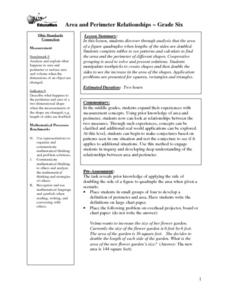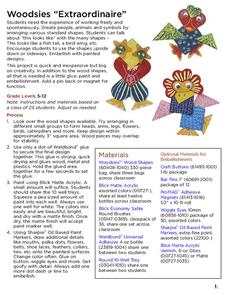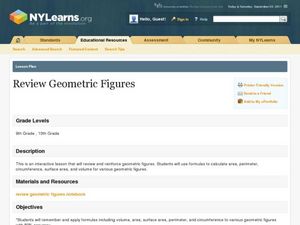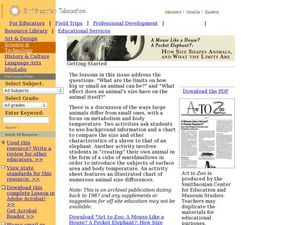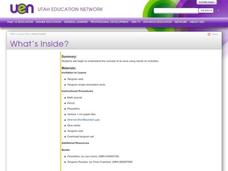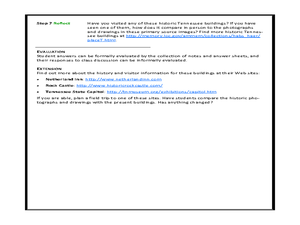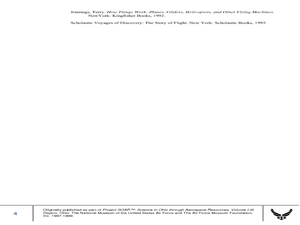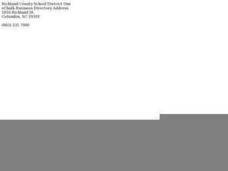Curated OER
Area and Perimeter Relationships
Sixth graders explore the relationship between area and perimeter. After discovering the definition of perimeter, 6th graders work together to create designs for a flower bed. They observe that the perimeter remains constant even...
Curated OER
Introduction to Area
In this area worksheet, students find the area of four rectangles when given the drawings with grid markings inside each. They use the area formula to find the area of five rectangles. This worksheet is intended to be used as a part of a...
Curated OER
Surface Area to Volume Ratio
Students examine the surface area to volume ratio and how they relate. In this surface area lesson students complete several activities.
Curated OER
Surface Area of Cubes and Rectangular Prisms
Eighth graders calculate surface area of 3-D shapes. In this geometry lesson, 8th graders analyze cubes and prisms by finding their area and surface area. They compare the data of these two shapes.
Curated OER
Exploring Number and Operation in Secondary Mathematics
Young geometers need a clear understanding of perimeter, volume, and area. This lesson provides a worksheet to help small groups of learners to calculate various measurements of objects and choose the proper units for measurement. It...
Curated OER
Woodsies "Extraordinaire"
Allow your class to use their imaginations and create fun creatures with various wooden shapes and other embellishments. What a great way to encourage your young artists to stretch their minds!
Curated OER
A Cone and Its Net
Create and investigate nets for solid shapes with your class. They identify the different parts and faces of each polygon and solid then calculate the surface area and volume of cones. They use circle sectors of varying sizes to build...
Curated OER
Review Geometric Figures
Youngsters review different geometric figures and shapes. In this geometry lesson, pupils use formulas to calculate area, perimeter, circumference and volume of geometric shapes. They calculate the surface area also.
Utah Education Network (UEN)
Candies R Us
A box is fun to make, especially when it's a candy box! These activities help to cement understanding of the difference between surface area and volume. Have individuals measure the surface area of their box in two-dimensions before...
Curated OER
Classifying Pyramids
Students study pyramids. In this prisms lesson, students explore the attributes of pyramids. Students will explore the lateral surface area of pyramids and be able to distinguish pyramids from other space shapes.
Mathematics Assessment Project
Evaluating Statements About Enlargements
Double, toil ,and double linear dimensions. Learners first complete an assessment investigating how doubling linear dimensions affects the area of pizzas and the volume of popcorn containers. They then complete an activity investigating...
Curated OER
How Size Shapes Animals
Students investigate how size affects large and small animals differently. In this animal lesson plan, students determine how size affects different animals by constructing their own animal out of marshmallows. Once students create...
Curated OER
Finding Areas of Plane Figures
Students compute areas of squares, rectangles, and so on and summarize the formulas for computing areas and explain how the formulas are derived and understand the reasoning behind them.
Curated OER
Amazing Transpiration
Learners observe a leaf and discuss the way that water is released from a leaf through its stomata. For this water cycle lesson, young scholars calculate how much water leaves produce from a whole tree.
Curated OER
Exploring Area and Perimeter
Two students are blindfolded and each receives a cardboard square, one with pompoms glued around the edge and one with pompoms glued all over the surface. They identify what they feel. The class discusses perimeter and area of polygons....
Curated OER
Area Explorations
Learners explore the concept of area. In this area lesson, students find the area of irregular shapes with right angles. Learners break down each irregular shape into multiple regular shapes in order to find the area. Students...
Curated OER
Surface Tension and 3D Soap Films
Students are introduced to the concept of surface tension, its dependence on material composition, and how it can produce uniquely shaped surfaces.
Curated OER
Area
Students use different shapes that represent tangrams to determine the area of a space. In this area lesson plan, students trace shapes and have their partners determine the area of that shape.
Curated OER
Finding the Area & Volume of Buildings Using Architectural Drawings
Fifth graders find the area and volume of buildings. For this architecture lesson, 5th graders look at the drawings of three historic Tennessee buildings. They use these to help find the area and volume of the building.
Curated OER
Pacing a Gunther Chain
Students pace a Gunther Chain, a measurement used by foresters to determine distance and area. They discuss that pacing is individualized depending on age, gender, etc. They practice to find an average pace. Teams estimate, pace and...
Curated OER
Cap-It to the Max
Eighth graders compare the volume of three cylinders constructed from the same size sheet of paper. They use concrete and graphical models to derive formulas for finding perimeter, circumference, area, and volume of two and three...
Curated OER
Parachutes: Is it Surface Area or Shape?
Students investigate how to make a good parachute. In this physics lesson, students observe the motion of parachutes as it falls and measure the time. They collect data and calculate the average descent time for each canopy shape.
Curated OER
Surface Area of Rectagular Prisms
Sixth graders investigate the area of polygons. In this geometry lesson, 6th graders calculate area of prisms using geometric formulas. They work with prisms and other rectangular shapes.
Curated OER
If you have to find the area of a region, how would you calculate it?
Fifth graders find the area of rice farms. In this area instructional activity, 5th graders draw shapes and grid them to find the area. They compare different rice fields to see which one takes up more space and has the larger area.
